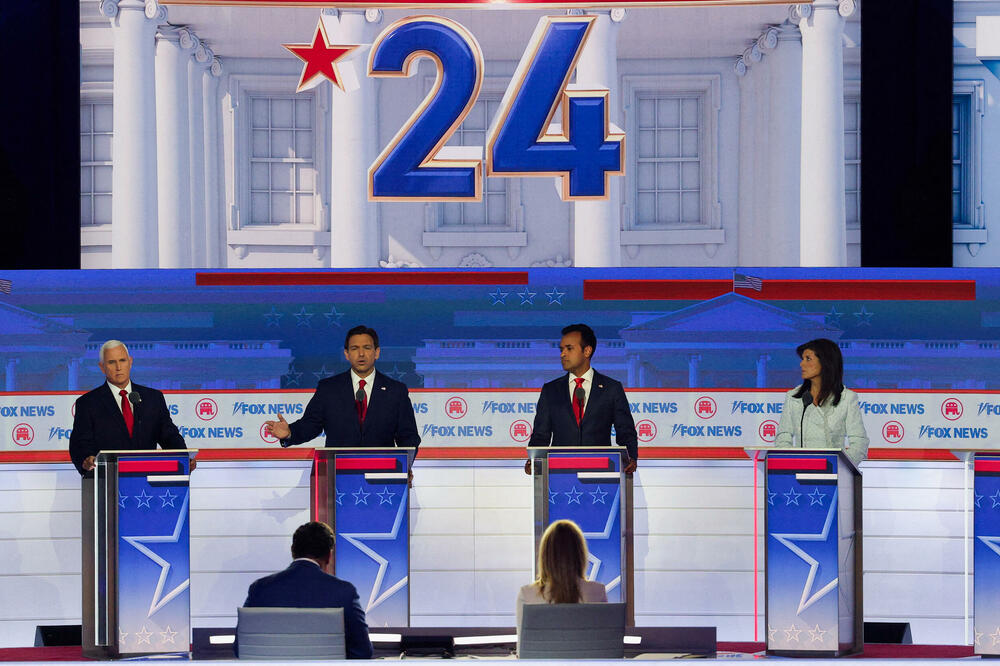The first debate between the candidates seeking to represent the Republican Party in next year's presidential election revealed serious divisions over foreign policy. Former US Vice President Mike Pence and former US Ambassador to the UN Nikki Haley advocated helping Ukraine in Russia's war of aggression against it, while Florida Governor Ron Desantis and businessman Vivek Ramaswamy expressed doubts about it. Former President Donald Trump - the undisputed front-runner among the candidates - did not participate in this debate, but he also opposes drawing the US into this conflict.
Polls show Republicans are as divided as the candidates. So there is a threat that if isolationist Republicans win the 2024 election, the US-led world order established at the end of World War II will find itself at a tipping point.
Historically, American public opinion has oscillated between extroverted and introverted moods. Seeing the tragic consequences of isolationist policies in the 1930s, President Franklin Roosevelt began a process that culminated in the creation of the Bretton Woods institutions in 1944 and the United Nations in 1945. Postwar decisions by President Harry Truman led to the creation of permanent alliances and a permanent US military presence abroad. The United States actively invested in the reconstruction of Europe with the help of the Marshall Plan (1948), created NATO (1949), led the UN coalition that fought in Korea (1950).
It was all part of a realistic strategy to contain Soviet power. However, that restraint was interpreted in different ways, and Americans had to engage in a heated, cross-party debate about interventions in developing countries, including Vietnam and Iraq. But while the ethics of these interventions have been questioned, the value of maintaining a liberal institutional order has been much less disputed. As the American theologian Reinhold Niebuhr once noted, the "happy ambiguity" of liberal internationalism saved it from succumbing to ideological rigor.
This is why the liberal world order enjoyed broad support in US foreign policy circles for many decades after World War II. However, in the 2016 presidential election, Trump's arguments that alliances and institutions created after 1945 benefited other countries at the expense of America resonated strongly with many voters. Yes, of course, his populist appeals were not only based on criticism of US foreign policy. Trump did not only take advantage of mass dissatisfaction with the economic problems that arose as a result of globalization and the great recession of 2008, but also the polarization of society due to cultural changes related to race, the role of women, and gender identity. However, by blaming “bad trade deals with Mexico and Canada” and “immigrants competing for jobs” for economic problems, Trump successfully linked nativist grievances to American foreign policy.
It is not, of course, Trump who is the first to use this formula. The current populist reaction had antecedents in the 1920s and 1930s. During the first twenty years of the last century, more than 15 million immigrants came to the United States. This caused many white Americans to fear being in the minority. In the early 1920s, the reborn Ku Klux Klan helped push through the National Origins Act to “prevent the dilution of the Nordic race” and protect the former, more homogeneous America. The election of Trump in 2016 was also a consequence of deep racial, ideological and class divisions that began to emerge in the 1960s (and his election was not the cause of them).
Many analysts worry that the result of American isolation could be the kind of international chaos that negatively marked the 1930s. Trump's supporters, however, argue that his administration's less generous and tougher stance has helped increase stability abroad and broaden support at home. However, the election of Trump was a clear departure from liberal traditions.
Some experts believe that the reason for the increase in Trump's popularity was the inability of the liberal elites to understand the basic preferences of the American people. But this is a superficial judgment. Yes, American public opinion is not unique, and elites are, as a rule, more interested in foreign policy than in society as a whole. However, we do understand how society's views have changed over time.
Since 1974, the Chicago Council on Global Affairs (CCGA) has regularly asked Americans whether the country should play an active role in the world or whether it should stay out of global politics. During all that time, about a third of society, following the tradition of the 19th century, always held to the isolationist point of view. In 2014, this number reached 41%. However, contrary to popular myths, 2016 did not mark the peak of post-1945 isolationism. In an election year, 64 percent of Americans said they welcomed the country's active participation in world affairs, a number that rose to 70 percent in 2018, the most since 2002.
Although full-blown 1930s-style isolationism is unlikely, many analysts still fear that a refusal to provide aid to Ukraine would signal a new retreat into American isolationism, which portends a serious weakening of the world order. The invasion launched by Russian President Vladimir Putin was a flagrant violation of the UN Charter. If Russia prevails in the occupied Ukrainian territory, it will violate the liberal principle that prohibits the use of force to change the country's borders. And therefore, the solidarity of the NATO countries that impose sanctions and supply military equipment to Ukraine is not only moral, but also practical and realistic.
The outcome of the events in Ukraine will seriously affect the future of Europe and the world as a whole. Although Putin and Chinese President Xi Jinping established a "borderless" partnership shortly before the invasion, China has (so far) been cautious in providing material aid to Russia. The Chinese leadership is undoubtedly upset by Putin's risky policies and the fact that an alliance with him is too expensive for Chinese soft power. If, however, Putin wins, China may learn that risk-taking pays off - and the rest of the world will learn that lesson.
Those who argue that America has no important national interest in helping Ukraine demonstrate a historically clouded view. Because of such naivety (and perhaps evil intent), they should be disqualified as presidential candidates.
The author is a professor at Harvard
Copyright: Project Syndicate: 2023.
(Translation: NR)
Bonus video:





